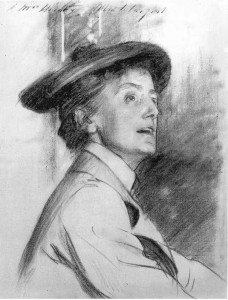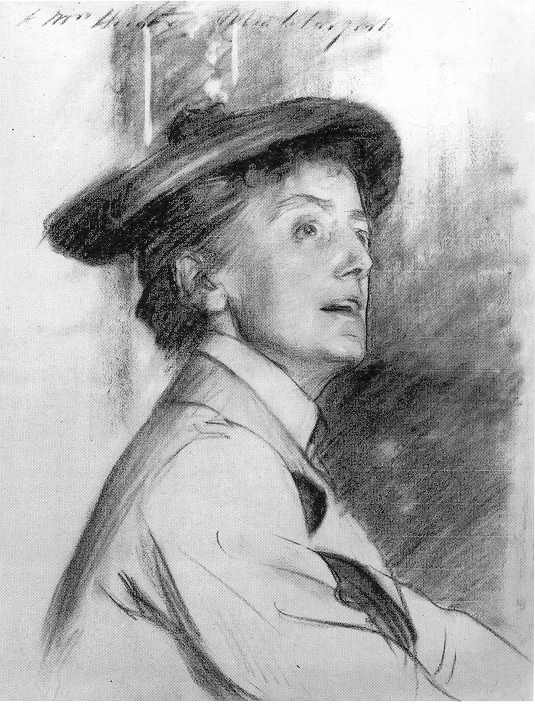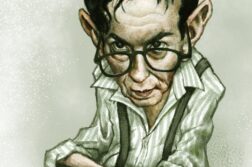IN LATE SPRING OF 2015, I received a flyer from Bard College advertising their SummerScape opera production of The Wreckers (1904), by the British composer Ethel Smyth, with a libretto by Harry Brewster. It took a moment for me to notice that the opera had been composed by a woman. Two thoughts occurred to me simultaneously: I had to see this opera, and who was Ethel Smyth? Despite growing up in a family that listened to opera as background music, I had never heard of her.

Who, then, was Ethel Smyth? Born in 1858, in England, she was destined to live large and aim high. A feisty child, she began studying music as a teenager and, despite her military father’s disapproval of this career path, forged ahead in her musical studies, attending the Leipzig Conservatory in Germany, where she met Brahms, Tchaikovsky, Dvořák, and Clara Schumann (husband Robert).
Smyth was not your average “Victorian woman.” She was a lesbian, a sports lover, a suffragist, and a composer. She was determined to be taken seriously by Europe’s music establishment or what she called “the male machine.” which she regarded as conservative and sexist, dismissing the very possibility that women could compose serious music. Despite this obstacle, Smyth managed to get her work published. She was a prolific composer of choral works, piano pieces, chamber music, vocal music, orchestral works, and of course, operas.
On March 12, 1903, New York’s Metropolitan Opera presented Smyth’s one-act opera Die Wald (lyrics by Henry Brewster). Until last fall, when the Met presented Kaija Saariaho’s L’Amour de Loin, Smyth’s opera Die Wald was the only opera composed by a woman ever performed there. That 113 years elapsed between these two performances attests to Smyth’s worst suspicions about the tyranny of the “male machine.”
Smyth was a committed suffragist who joined the Women’s Social and Political Union to fight for the right to vote. She composed the group’s anthem, “The March of the Women,” in 1911. Smyth became very close to one of the foremost leaders of the women’s suffrage movement, Emmeline
Pankhurst, with whom she may have been lovers. In 1912, along with other suffragists, Smyth took up the call by Pankhurst to break the windows of conservative politicians who opposed women’s right to vote, and they proceeded to do so with hammers and stones. Smyth and Pankhurst were among those arrested. The conductor Sir Thomas Beecham reported that he witnessed Smyth conducting “The March of the Women” from her jail cell, and marking time with a toothbrush while a chorus of suffragists sang outside Holloway Prison.
Smyth managed to attract influential and wealthy female patrons, including the Empress Eugenie and the Princesse Edmonde de Polignac (née Winnaretta Singer, heiress to the Singer sewing machine fortune), who was also her lover. She was involved with many other women, notably: Edith Craig, daughter of the actress Ellen Terry; author Christabel Marshall; and harpsichordist Violet Gordon-Woodhouse. At the age of 71 Smyth fell in love with Virginia Woolf, who was in her fifties. They wrote each other daily. Their relationship reportedly remained platonic, but this is unclear. Smyth wrote about Woolf: “I don’t think that I have ever cared for anyone more profoundly.”
In 1922, Smyth was made a Dame Commander of the Order of the British Empire (DBE). She was the first woman composer to be made a dame. She also was awarded honorary degrees from Oxford and the University of Durham. By her later years, Smyth started going deaf. Undaunted, she turned her attention from music to other pursuits, such as writing and golf. In 1934, in celebration of her 75th birthday, Sir Thomas Beecham conducted a royal command performance of her work at Albert Hall in London. By this time, she was completely deaf and unable to hear a note.
Ethel Smyth died in 1944 at age 86. She was remembered by Judy Chicago in The Dinner Party (1979), a permanent art installation at the Brooklyn Museum. Smyth was a heroic woman who can serve as a model of perseverance and courage. In 1901, the painter John Singer Sargent sketched Smyth as a strong woman gazing off into the distance, perhaps pondering her destiny. She became an indomitable spirit whose life and work continue to resonate with us today.
Irene Javors, a psychotherapist in private practice in New York City, is the author of Culture Notes: Essays on Sane Living.





